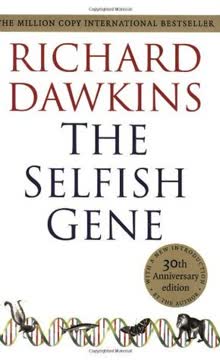Key Takeaways
1. Genes are the fundamental units of natural selection
"The gene is the basic unit of selfishness."
Replicator revolution. Genes, not individual organisms or species, are the primary units of natural selection. As replicators, genes strive to make copies of themselves and pass them on to future generations. This shift in perspective from organism-centered to gene-centered evolution explains many puzzling aspects of biology.
Survival of the fittest genes. Natural selection favors genes that are better at replicating themselves, regardless of their effects on individual organisms. This can lead to seemingly paradoxical situations where genes promote behaviors that may be detrimental to the organism but beneficial for the gene's propagation.
Key characteristics of successful genes:
- Longevity: ability to persist over time
- Fecundity: ability to make many copies
- Copying-fidelity: accuracy in replication
2. Organisms are survival machines for genes
"We are survival machines – robot vehicles blindly programmed to preserve the selfish molecules known as genes."
Living vessels. Organisms, including humans, are essentially vehicles constructed by genes to ensure their own survival and replication. Our bodies, behaviors, and even our consciousness are shaped by the evolutionary interests of our genes.
Genetic puppeteers. Genes influence organisms through complex developmental processes, creating bodies and behaviors that maximize their chances of being passed on. This doesn't mean genes are conscious or purposeful, but rather that natural selection has favored genes that build effective survival machines.
Examples of organisms as gene vehicles:
- Beaver dams as extended phenotypes of beaver genes
- Parasites manipulating host behavior to spread their genes
- Human cultural practices influenced by genetic predispositions
3. Altruism and selfishness are gene-level strategies
"Nice guys finish first."
Cooperation for selfish ends. Seemingly altruistic behaviors can evolve when they benefit the genes responsible for them. Kin selection explains how genes promoting altruism towards relatives can spread, as relatives share a high proportion of genes.
Evolutionary game theory. The evolution of cooperation and altruism can be understood through models like the Prisoner's Dilemma and the concept of evolutionarily stable strategies (ESS). Strategies like "tit-for-tat" can promote cooperation even in competitive environments.
Forms of gene-level altruism:
- Parental care
- Alarm calls in birds
- Worker sterility in social insects
4. Genes can influence behavior across species boundaries
"To a good approximation, all species are insects."
Parasite manipulation. Genes can exert influence beyond their own organisms, manipulating the behavior of other species to their advantage. This is particularly evident in parasites that alter host behavior to facilitate their own transmission.
Coevolutionary arms races. The interactions between species, such as parasites and hosts or predators and prey, drive complex evolutionary dynamics. These relationships can lead to intricate adaptations and counter-adaptations over time.
Examples of cross-species gene influence:
- Cuckoos manipulating host bird behavior
- Parasitic fungi altering ant behavior
- Viruses inducing symptoms that aid their spread
5. The extended phenotype: genes' effects reach beyond the body
"The long reach of the gene."
Beyond bodily boundaries. The concept of the extended phenotype expands our understanding of how genes influence the world. A gene's effects are not limited to the body in which it resides but can extend to the environment and other organisms.
Rethinking adaptation. This perspective challenges us to reconsider what constitutes an adaptation. Structures like beaver dams or bird nests can be seen as extended phenotypes of the genes that influence their construction.
Examples of extended phenotypes:
- Caddis fly larval cases
- Spider webs
- Human technological artifacts
6. Cooperation and conflict in gene-organism relationships
"We can see how cooperation and mutual assistance can flourish even in a basically selfish world."
Genetic interests. While genes within an organism generally cooperate, there can be conflicts of interest. Some genes may benefit at the expense of others or the organism as a whole, leading to phenomena like meiotic drive.
Symbiosis and parasitism. The relationship between genes and organisms extends to interactions between different species. Symbiotic relationships can evolve when the genetic interests of different species align, while parasitism occurs when they diverge.
Factors influencing gene-organism cooperation:
- Shared routes of transmission
- Alignment of reproductive interests
- Degree of genetic relatedness
7. Cultural evolution and memes: a new replicator
"What is the selfish gene? It is not just one single physical bit of DNA... Just as in the primeval soup, it is all replicas of a particular bit of DNA, distributed throughout the world."
Cultural replicators. Memes, units of cultural information, can be understood as a new type of replicator analogous to genes. Like genes, memes undergo a form of evolution through variation, selection, and inheritance.
Coevolution of genes and culture. Cultural evolution interacts with genetic evolution, creating complex dynamics. Memes can influence the selective pressures on genes, and vice versa, leading to unique human adaptations.
Characteristics of successful memes:
- Easy to understand and remember
- Motivate individuals to spread them
- Adapt to changing cultural environments
8. The power of reciprocal altruism in nature and human society
"The meme for blind faith secures its own perpetuation by the simple unconscious expedient of discouraging rational inquiry."
Cooperation beyond kinship. Reciprocal altruism explains how cooperation can evolve between unrelated individuals. By helping others with the expectation of future reciprocation, organisms can reap long-term benefits.
Human implications. Understanding reciprocal altruism provides insights into human behavior, ethics, and social institutions. It helps explain the evolution of complex social behaviors and moral systems.
Key factors in the evolution of reciprocal altruism:
- Repeated interactions
- Ability to recognize individuals
- Memory of past behaviors
- Capacity for conditional strategies
9. Sexual selection and mate choice as evolutionary strategies
"The gene is the basic unit of selfishness."
Beyond natural selection. Sexual selection, driven by competition for mates and mate choice, can lead to the evolution of traits that may seem detrimental to survival but increase reproductive success.
Gene-level perspective. Understanding sexual selection from a gene's-eye view explains seemingly paradoxical traits like elaborate ornaments or risky behaviors. These traits evolve because they increase the chances of the underlying genes being passed on.
Forms of sexual selection:
- Male-male competition (e.g., antlers in deer)
- Female choice (e.g., peacock's tail)
- Sexual conflict (e.g., differing optimal mating rates)
This summary captures the key ideas and implications of Dawkins' "The Selfish Gene," presenting them in a concise and accessible format while preserving the book's core arguments and revolutionary perspective on evolution.
Last updated:
FAQ
What's The Selfish Gene about?
- Gene-Centric View: The Selfish Gene by Richard Dawkins posits that genes are the primary unit of natural selection, driving evolution and behavior.
- Selfishness and Altruism: It explores how genes, while inherently selfish, can lead to altruistic behaviors, especially towards relatives.
- Cultural Evolution: The book introduces memes as cultural replicators, suggesting that cultural ideas evolve similarly to genes.
Why should I read The Selfish Gene?
- Understanding Evolution: The book offers a clear explanation of evolutionary theory, making complex ideas accessible to a general audience.
- Influential Concepts: It introduces key ideas like "selfish genes" and "memes," which have impacted both scientific thought and popular culture.
- Provocative Insights: Dawkins challenges traditional views on altruism and cooperation, encouraging readers to rethink human and animal behavior.
What are the key takeaways of The Selfish Gene?
- Genes as Replicators: Genes are the fundamental units of selection, striving to replicate through the survival of their host organisms.
- Kin Selection: Altruistic behaviors often arise among relatives, as helping kin can increase the chances of shared genes surviving.
- Memes as Cultural Replicators: Cultural ideas and behaviors can replicate and evolve similarly to biological genes.
What are the best quotes from The Selfish Gene and what do they mean?
- "We are survival machines": This quote emphasizes that organisms exist primarily to propagate their genes, highlighting a gene-centric view of evolution.
- "Let us try to teach generosity": Dawkins acknowledges the inherent selfishness of genes while advocating for the cultivation of altruistic behaviors in society.
- "The gene is the basic unit of selfishness": This statement reinforces the idea that genes operate under a selfish imperative, influencing behaviors that enhance their own survival.
What is the concept of the "selfish gene" in The Selfish Gene?
- Definition: The "selfish gene" refers to the idea that genes act to maximize their own replication and survival, often at the expense of the organism.
- Behavioral Implications: Behaviors perceived as altruistic may actually be strategies to enhance the survival of shared genes among relatives.
- Gene-Centered Evolution: Understanding evolution through gene selfishness provides a clearer explanation for complex behaviors in animals and humans.
How does Richard Dawkins explain altruism in The Selfish Gene?
- Kin Selection Theory: Dawkins discusses how individuals are more likely to exhibit altruistic behaviors towards close relatives, sharing significant genetic material.
- Gene Survival: Altruistic acts can benefit gene survival, as saving a relative can ensure shared genes continue in the gene pool.
- Examples in Nature: The book provides examples of altruistic behaviors in various species, illustrating genetic relationships' role.
What role do memes play in The Selfish Gene?
- Definition of Memes: Memes are cultural replicators, akin to genes, spreading ideas, behaviors, and practices through imitation and social learning.
- Cultural Evolution: Memes evolve through variation, competition, and inheritance, similar to biological evolution.
- Impact on Society: Memes highlight how cultural phenomena can replicate and influence human behavior, paralleling genetic mechanisms.
How does The Selfish Gene address the nature vs. nurture debate?
- Genetic Influence: Dawkins acknowledges genes' significant role in shaping behavior but also emphasizes environmental factors and learning.
- Complex Interactions: While genes provide a framework for behavior, individual experiences and cultural influences can modify genetic predispositions.
- No Absolute Determinism: Dawkins argues against a strict nature vs. nurture dichotomy, proposing that both genetic and environmental factors interact to shape behavior.
What is the significance of the "gene pool" in The Selfish Gene?
- Definition of Gene Pool: The gene pool is the total collection of genes within a population, representing genetic diversity for natural selection.
- Evolutionary Stability: The gene pool changes as genes compete for survival, leading to shifts in allele frequencies over generations.
- Implications for Species: Understanding the gene pool helps explain how populations adapt to environments and how traits become prevalent or diminish.
How does Richard Dawkins use examples from nature to illustrate his points in The Selfish Gene?
- Diverse Species: The book includes examples from species like honeybees and black-headed gulls to demonstrate concepts like kin selection and altruism.
- Behavioral Observations: Dawkins analyzes behaviors such as parental care and social interactions to show how they can be explained through gene selfishness.
- Real-World Applications: These examples ground theoretical concepts in observable phenomena, making arguments more relatable and understandable.
What is the extended phenotype concept in The Selfish Gene?
- Definition: The extended phenotype refers to the idea that genes' influence extends beyond the organism to affect the environment and other organisms.
- Examples in Nature: Dawkins uses examples like beaver dams and spider webs to illustrate how genes manifest in structures and behaviors impacting ecosystems.
- Implications for Evolution: This concept challenges traditional views of genes as solely responsible for individual traits, emphasizing their role in shaping the broader environment.
How does The Selfish Gene address the concept of group selection?
- Critique of Group Selection: Dawkins argues against natural selection operating primarily at the group level, emphasizing genes as the true drivers of evolutionary change.
- Kin Selection as an Alternative: Instead of group selection, Dawkins highlights kin selection as a more viable explanation for altruistic behaviors.
- Evolutionary Stability: The book discusses how group selection theories often fail to account for genetic interactions' complexities within populations.
Review Summary
The Selfish Gene is widely praised as an influential and accessible work on evolutionary biology. Readers appreciate Dawkins' clear explanations of complex concepts, his use of engaging examples, and his thought-provoking ideas about genes as the primary unit of natural selection. Many find the book enlightening and paradigm-shifting, particularly the chapters on memes and game theory. Some criticize Dawkins' reductionist approach or perceived dismissal of religion, but most reviewers consider it a must-read for anyone interested in genetics and evolution.
Similar Books







Download PDF
Download EPUB
.epub digital book format is ideal for reading ebooks on phones, tablets, and e-readers.













